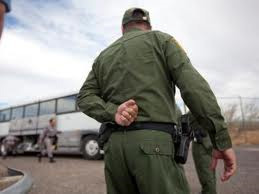
|  |  |  Americas & Beyond Americas & Beyond  
Border Patrol Resumes Release of Illegal Immigrants from Arizona at Texas-Mexico Border
 Brandi Grissom - Houston Chronicle Brandi Grissom - Houston Chronicle
go to original
December 13, 2010


| | The goal of the transfer program is to break the smuggling cycle in the Arizona-Sonora area. |  |
U.S. Border Patrol buses loaded with undocumented immigrants are set to begin rolling into Texas from Arizona again this week, Gov. Rick Perry's office said last week. And he's not happy about it.

"We weren't in favor of it then, and we certainly aren't now," Perry spokeswoman Katherine Cesinger says of the controversial Alien Transfer and Exit Program.

Under the program, the agency transports illegal border-crossers caught in Arizona to the Texas border and deports them back to Mexico. The Border Patrol first started the program in November 2009: Two buses per day, each loaded with up to 47 male illegal immigrants aged 20 to 60, were taken from Arizona to Presidio, where they were deported to Ojinaga, Mexico. The program generated heated resistance from state officials, including Perry, who worried about an influx of illegal immigrants, and from local officials, who said the remote area could not handle an onslaught of new people.

The goal of the transfer program, according to Border Patrol officials, is to break the smuggling cycle in the Arizona-Sonora area. In the metropolitan area of Tucson, human smugglers abound, and illegal Mexican immigrants can easily blend into the population. Those conditions don't exist in the rural, isolated areas of the Texas-Mexico border.

Though a Border Patrol official could not provide statistics Wednesday, he said the program last year was successful. But it remains unclear whether the smuggling cycle was broken. Immigrants transported to Ojinaga received free transportation from the Mexican government to return to their homes, setting them up to easily attempt another border crossing.

The Border Patrol put the program on pause last December because officials said illegal crossings in Arizona had slowed. They said they would use the break to review the program's effectiveness.

Now, almost a year later, the program is being restarted. But this time they will be transporting illegal immigrants primarily to Del Rio, a larger town than Presidio, and deporting them across the Rio Grande to Ciudad Acuña in Mexico.

Del Rio Mayor Roberto Fernandez said Wednesday that Border Patrol officials had not informed him that buses were scheduled to arrive in his city. Fernandez says he doesn't see the logic behind the plan. "They're obviously coming over here for a better quality of life for themselves and their families," he says. "If they're that determined, they're going to try again. What's the difference if they try again in Arizona or in Texas?"

Cesinger says the governor thinks the program doesn't make sense. "If their ultimate goal is to send these individuals back to Mexico, the fastest route from Arizona ... is certainly not through Del Rio, Texas," she says. Instead of spending resources on busing undocumented immigrants from one state to another, Cesinger says, the federal government should focus on securing the U.S.-Mexico border.

Border Patrol spokesman Bill Brooks says the program has worked before and that it doesn't divert any border resources because contractors operate the buses. "The men and women of the U.S. Border Patrol are still out there patrolling the border 24 hours a day, seven days a week," he says.

This article originally appeared in The Texas Tribune.
|

 |
|  |



